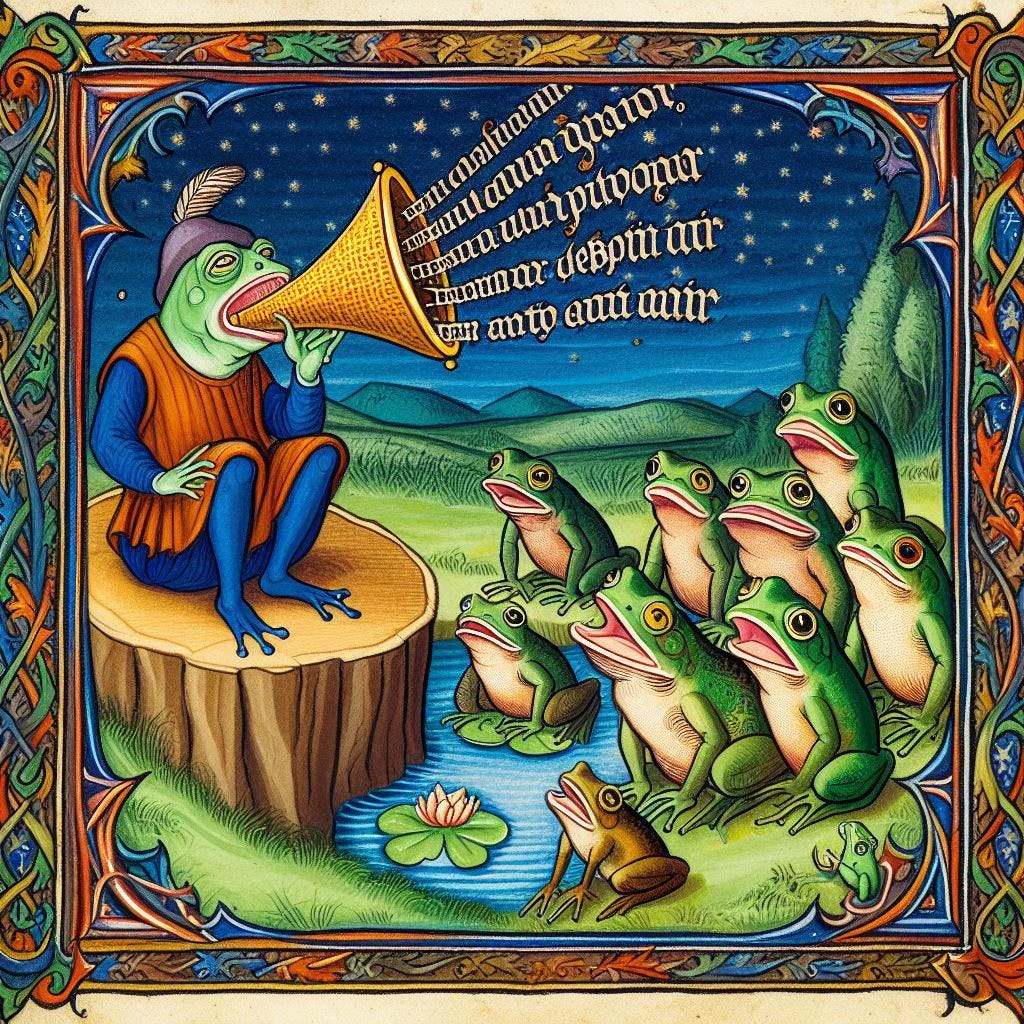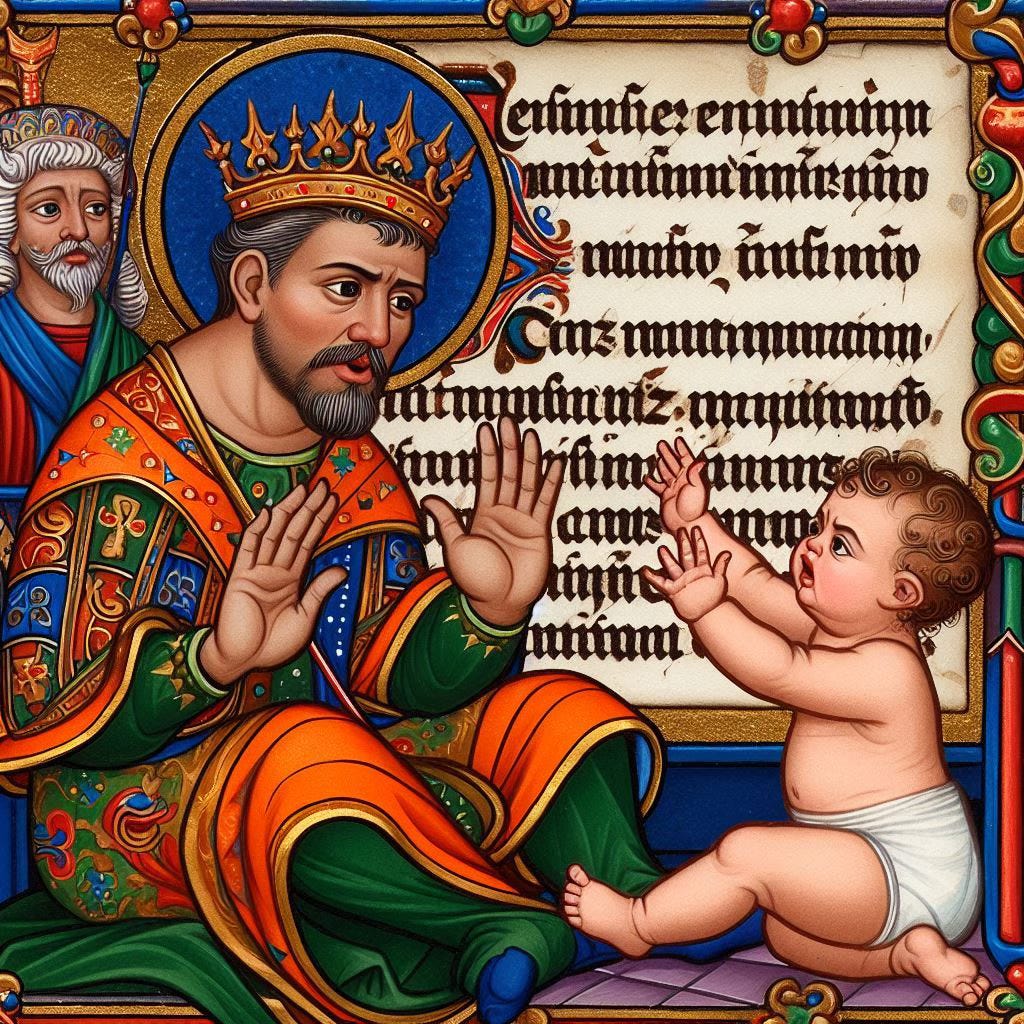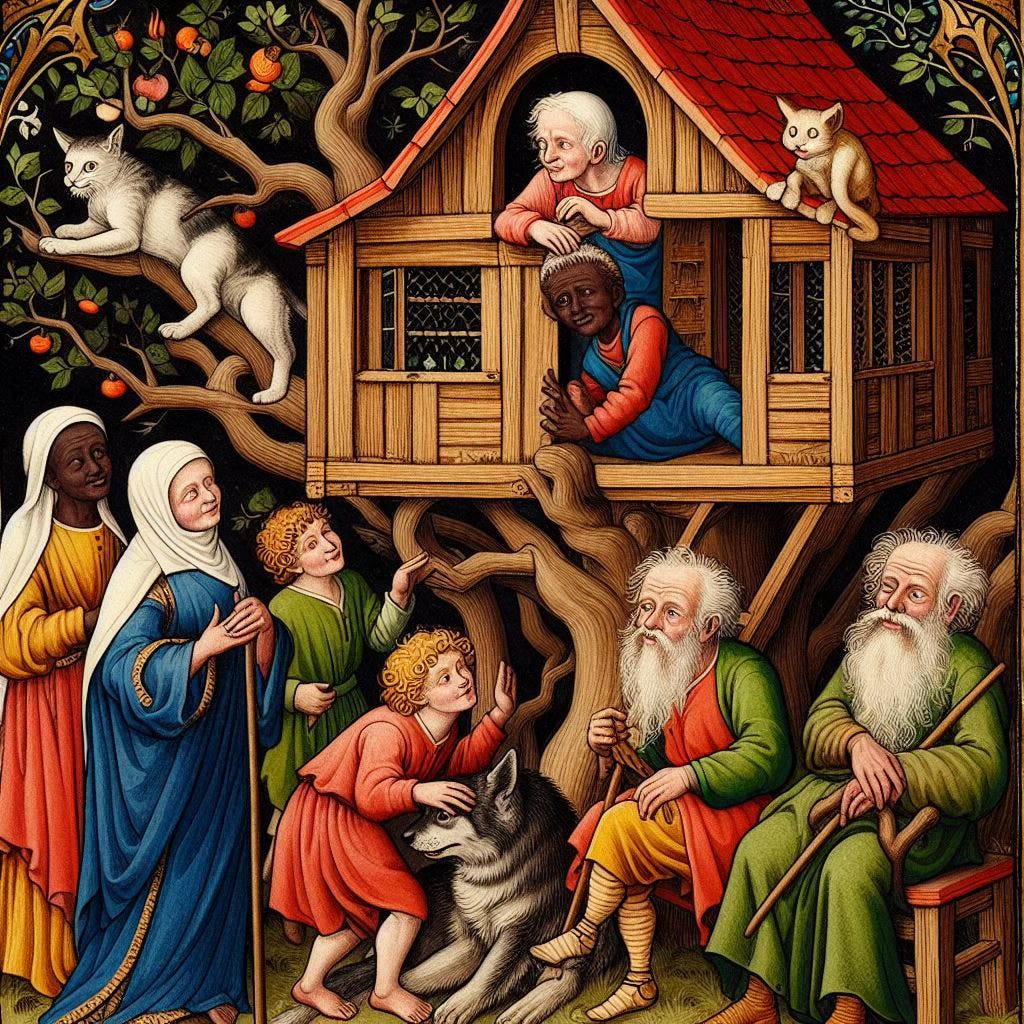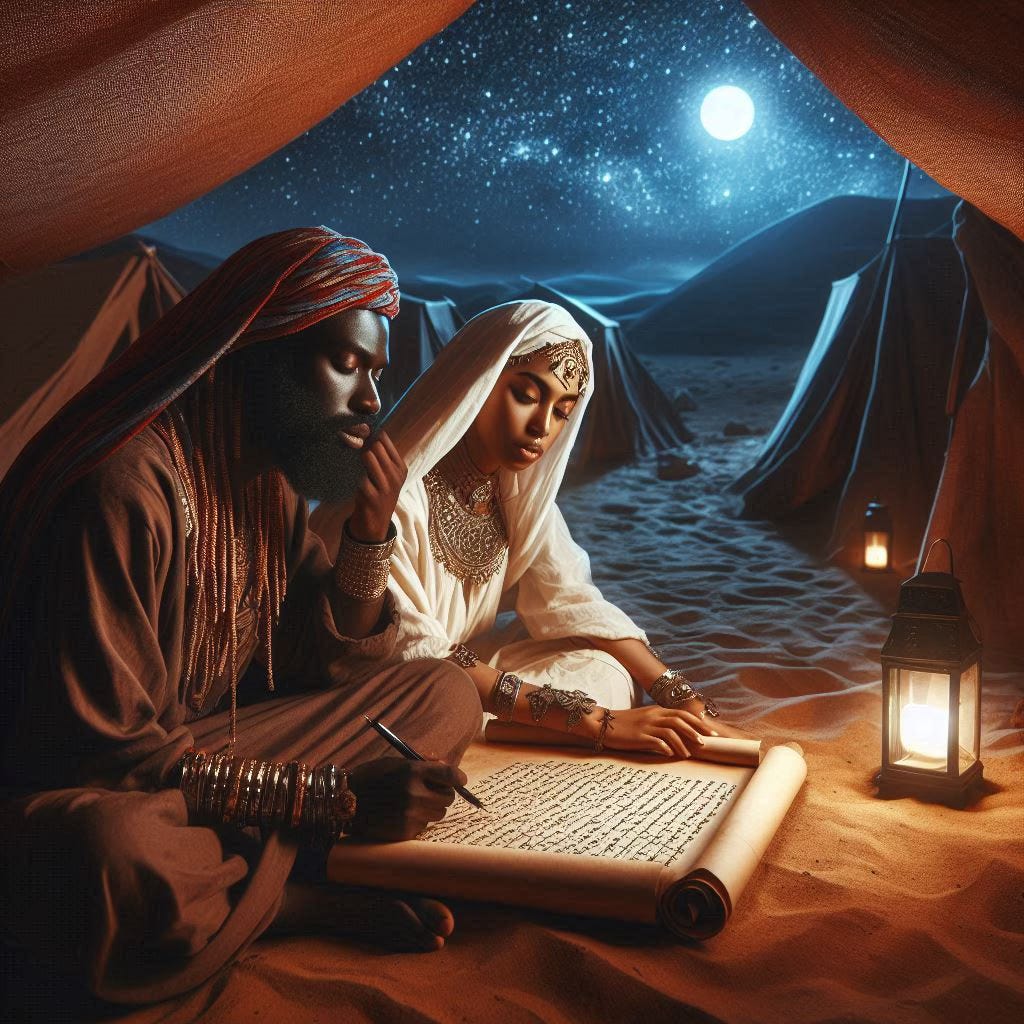Father Abraham's lit crit
Finding alternative communities in Dickinson, Shakespeare & Capote
Political theories and movements, such as Marxism and feminism, often spawn schools of literary criticism. These schools work for me when
They discover worthwhile textual insights that I hadn’t noticed,
They demonstrate that the given political theory, or part of it, can be understood as a worldview, and
They encourage my own close, interdisciplinary readings of texts.
Can the Bible’s Abraham do this? Time to exercise our theopolitical—and now theopoliticalliterary—imagination! I’ll try out Abraham’s great political concept—covenants—on a poem, a play, and a novel, all familiar to most.
Covenants: Abraham’s answer to domination
Political theorist Hannah Arendt makes Abraham out as a compulsive covenant-cutter:
[Abraham’s] whole story, as the Bible tells it, shows such a passionate drive toward making covenants that it is as though he departed from his country for no other reason than to try out the power of mutual promise in the wilderness of the world, until eventually God himself agreed to make a Covenant with him.1
Specifically, “to try out the power of mutual promise,” Abraham departs Mesopotamia, one of the world’s first empires. This bit of Abrahamic background is significant: Arendt understands covenant, or mutual promise as she more often calls it, as a way of making a future together that rivals the future-fixing capacity found in all forms of political domination, including empires:
. . . the faculty of promising [is] the only alternative to a mastery [of, inter alia, relying on the future] which relies [also] on domination of one’s self and rule over others; it corresponds exactly to the existence of a freedom which was given under the condition of non-sovereignty.2
So when we covenant together, we work together to create a future—not one without contingency, but one with flexibility, objectivity, and community.
Theologian Walter Brueggemann finds the same tension that Arendt finds between futures generated by domination and by covenant. He compares “imperial accounts of reality” with the Hebrew Bible’s “emancipatory covenantal tradition” for the futures those political ideas work toward:
Whereas imperial accounts of reality specialize in static order and the maintenance of preferred arrangements in the political economy, the tradition of emancipatory covenant-making, by contrast, affirms human agents who have the capacity and responsibility to act transformatively for the well-being of the human community and the ecology of creation.3
Covenant fosters natural and political creation. God’s first act of creation—light, and the separation of light from darkness—in Jeremiah’s pages becomes “the covenant that I made for the day and the night.”4 God’s covenant with Abraham leads to the creation of Israel, an alternative to the empire that Abraham has forsaken.
Covenant communities always begin as alternatives to communities under domination. That is, the Bible’s “emancipatory covenantal tradition” always involves emancipation—Abraham and his seed from Mesopotamia, for instance, and Moses and the new nation of Israel from Egypt.
Can Abraham’s political concept of covenant, which forges and anchors ancient Israel as an alternative political community to its neighboring empires, offer insights into literature? And the other way round: can a kind of “covenant lit crit” help reintroduce politics to us as acts of co-creation?
Dickinson’s two forms of public life
Emily Dickinson’s “I’m Nobody! Who are you?” opens with the poet and us discovering each other in a kind of pre-creational darkness and ends with our new community listening in on “somebody”:
I'm nobody! Who are you?
Are you nobody, too?
Then there's a pair of us — don't tell!
They'd banish us, you know.How dreary to be somebody!
How public, like a frog
To tell your name the livelong day
To an admiring bog!
For most readers, the poem’s tension comes from its dichotomy between private and public, between Nobody and Somebody. Better to be a private Nobody, this reading suggests, than to be a garrulous, self-centered public figure.
But Abraham, perhaps, would find instead that the poem’s tension comes from its dichotomy between how the Nobodies and the Somebody understand public space.
The poem’s Nobody and Somebody both seek public space. The Nobody looks for strangers—fellow Nobodies—with whom to create public space. But the Somebody seeks for an audience through whom he can dominate public space.
In other words, the poem compares two ways of moving from our glorious but wholly private Nobody-ness to community:
In the first way, we can become public in an almost Buberian “I-You” sense—”a pair of us.” The poem’s third line seems to arrive as a covenant, as something greater than the sum of the two individuals. The rest of the stanza suggests the new community’s power through the opposition the narrator expects it to draw. The community’s formation leads to the poem’s only imperative, “don’t tell!” The next line’s “they”—the preexisting community—would threaten members of its new alternative with exile.5
In the second way, we can become “public, like a frog.” We can deny everyone else public space by dominating it ourselves. Anyone entering what remains of public space hears only our self-aggrandizing racket “the livelong day.” For this domination to work, we must indeed “banish” any associations that create alternative public spaces.
Ironically, particularly in view of the accepted reading of the poem as contrasting a “good private” with a “bad public,” the two Nobodies create public space, while the public Frog is actually alone, surrounding himself only with other frogs whom he has reduced to admiring objects.
In this Abrahamic analysis of Dickinson’s poem, we are offered a choice: we can create a future either together through covenant or alone through domination.6 To do it through covenant is to interrupt domination-oriented forms of politics, forms that, Arendt points out, “can last and creep on for centuries”—Arendt’s version of Dickinson’s “livelong day.”7
Romeo and Juliet as interruptors
For Arendt, covenant is a means of interrupting these centuries-long forms of domination and beginning again:
The life span of man running toward death would inevitably carry everything human to ruin and destruction if it were not for the faculty of interrupting it and beginning something new, a faculty which is inherent in action like an ever-present reminder that men, though they must die, are not born in order to die but in order to begin.8
We are born interruptors, Arendt says. We break into inevitability and demonstrate possibility. Covenants allow us to do this—our lives’ work—together for the love of the world.9
Arendt’s concept of natality, her idea that we were “not born in order to die but in order to begin,” is a theme in Romeo and Juliet, not often appreciated as one of Shakespeare’s most political plays. In Act 3, Paris visits the Capulets to woo their daughter Juliet, but the Capulets tell him that Juliet is in her bedroom mourning her cousin Tybalt’s death. Before planning Paris and Juliet’s wedding, however, Capulet dismisses the subject of Tybalt: “Well, we were born to die.”
Meanwhile, in Juliet’s bedroom, Romeo and Juliet are consummating their marriage covenant.
Romeo and Juliet were born “in order to begin,” and from Abraham’s perspective, covenanting is the means of beginning together. The tragedy of Romeo and Juliet, from an Abrahamic standpoint, is that the public covenant of marriage in the protagonists’ case has to remain private. Covenants, however, are public by definition: they create public freedom. The animosity between the Montagues and the Capulets is so deep that in Verona, no covenant is possible.
Our country’s greatest covenants include the Declaration of Independence and the Constitution, which are more threatened today than at any time since the end of Reconstruction. Most of us have grown used to living in a society in which no political covenant seems possible to enter into. But like the Montagues and Capulets, we could learn a lot from our children.
And for the love of the world, we might encourage them to interrupt.
Capote’s treehouse as an alternative community
Interruptions abound for a few days one autumn in Truman Capote’s The Grass Harp. Two teens and three older adults live in a China tree and its treehouse as an alternative community. These newly freed citizens come to the tree with individual backstories that paint them as refugees from their small Louisiana town’s society.
Dolly, the novel’s main character, retreats to the tree because her sister Verena, the town’s richest and most powerful citizen, insists with her new business partner on making a mint off of Dolly’s dropsy cure. But Dolly, to that point always governed by Verena, keeps the formula to herself. Her medicine and its tiny clientele are the only things that have kept Dolly connected to the world outside Verena’s home. When Verena responds to Dolly’s refusal by saying how much Dolly has shamed her over the years, Dolly leaves with Catherine, her Black friend who lives in a cabin on Verena’s property, and with Collin, our sixteen-year-old orphaned narrator.
Verena twice has the town authorities attempt to sweep the tree’s alternative community. Both attempts fail. The first attempt, though, adds the last two members to the new community: Riley, an older teen who joins them ostensibly for adventure but actually to discover his own feelings after a difficult upbringing, and Charlie Cool, a retired judge and a freethinker who joins them to find community.
Judge Cool has the clearest vision for the new community, and Capote puts the novel’s theme in his mouth:
“It may be that there is no place for any of us. Except we know there is, somewhere; and if we found it, but lived there only a moment, we could count ourselves blessed.”
The Judge here seems to echo God’s words to Abraham about the extent of Abraham’s own alternative community: “in your seed all the nations of the earth shall be blessed.”10
The tree community proves resistant to the sheriff’s violence and the minister’s shaming, but its survival hinges on the possibility of covenant, which the novel, like Romeo and Juliet, explores through the motif of marriage.
Capote examines this marriage motif first by means of three homes—the China tree, Catherine’s cabin, and a houseboat. The China tree itself is a living covenant, a marriage of two trees with branches “so embraced that you could step from one [tree] into the other.” The treehouse—the possibility of home—bridges the two trees. After voicing her displeasure, though, with living in the tree, Catherine claims ownership of the cabin on Verena’s property by adapting the concept of common-law marriage:
“If you sweep a house, and tend its fires and fill its stove, and there is love in you all the years you are doing this, then you and that house are married, and that house is yours.”
But the next paragraph, dedicated to Collin’s idea that they live in a nearby abandoned houseboat instead of the tree, undermines Catherine’s idealism. The houseboat’s owner abandoned it after applying for a marriage license with a fifteen-year-old Black girl. She and this older white man were very much in love, but the town banished him when its citizens got wind of his application.
As the Judge says, the town conspires “to deny the differences.” Verena owns the town’s public space, controlling both its governmental and religious expression, and like all authoritarians, she expects conformity.
The novel’s climax comes after Verena’s second failed attempt to sweep the tree community. Verena, now somewhat broken in spirit after her business partner runs away with most of her savings, tries to win Dolly back despite Dolly’s recent engagement to marry the Judge.
As in Romeo and Juliet, blood (though at least not a blood feud) wins out over covenant. Verena persuades Dolly to break off her engagement. Dolly’s return home is an unconditional surrender: she agrees to let Verena make all the decisions for her again.
As Abraham demonstrates, covenant is a breaking away as well as an entering in. Dolly, the alternative community’s founder, couldn’t break away for long from the town’s system of domination personified—and controlled—by her sister. But the novel offers us hope. The alternative community disbanded, but its citizens, who experienced political freedom for only a moment, could count themselves blessed.
No trace of this Abrahamic analysis of The Grass Harp, however, appears in Orville Prescott’s review published in the New York Times the day after the novel’s 1951 publication. Prescott ends his review by misapprehending the novel’s theme:
Poor Dolly's need for a private world of her own is a need shared by many. Her discovery, when, well past 60, that the real world was a bad place is both comic and pitiful. "The Grass Harp" is not a powerful or important novel. It is an extremely well-written one.
Dolly, though, comes to the novel enveloped in her rich, private world. She moves to the tree to create a public world that is not “a bad place” like the town. She comes close to entering into a covenant that would permit the town’s refugees a public future, a responsible and fulfilling one starting with her and her fiancé, the Judge, and her other friends.
Abraham is a rare character: people rarely leave the bondage they know to create an unfamiliar and lasting public freedom with others. Those that do are often persecuted as nonconformists or aliens. The Grass Harp may be short and light, but Prescott is wrong: it is also powerful and important.11
The first illustration in this article is from Stockcake.com. The other illustrations were generated using Bing Image Creator. The short footnotes below refer to the full citations in the manuscript’s and this Substack’s bibliography.
Arendt, Human Condition, 243-44.
Arendt, 244.
Brueggemann, God, Neighbor, Empire, 5.
Jeremiah 33:20 REB.
Or with advertising, depending on the poem’s version. Advertising would destroy the new community with the same success that the frog enjoys in the second stanza.
Arendt points out that under a tyranny, “fear and mutual mistrust make ‘acting in concert,’ in Burke’s phrase, impossible.” Arendt, Promise of Politics, 69.
Arendt, Between Past and Future, 167.
Arendt, Human Condition, 246. I published an earlier version of this article’s Shakespeare section in a Substack note.
One of the most moving statements I’ve found about our role in the world is from Arendt: “Courage liberates men from their worry about life for the freedom of the world. Courage is indispensable because in politics not life but the world is at stake.” Arendt, Between Past and Future, 155.
Genesis 22:18 NNAS.
The novel is also offensive in places. Prescott points out that “It contains a few unnecessarily vulgar passages and references to degeneracy . . .” I’m afraid I missed that. But no one could miss antisemitic and homophobic tropes in the characterization of two minor characters.








With Bryce, the Bible, theology, literature and the arts, politics, and philosophy are out of their silos forever. Call it commingling in three dimensions. So, here is "covenant," understood comprehensively yet concisely. Thanks!
Marvelous reflections here—could a book be percolating?🙂